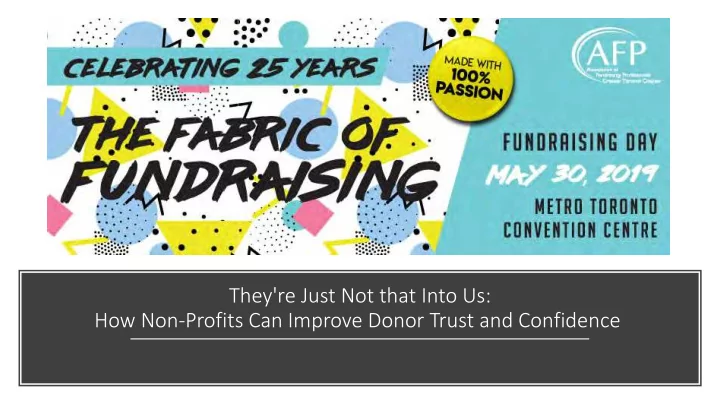

They're Just Not that Into Us: How Non-Profits Can Improve Donor Trust and Confidence
Carolyn Warnica Research & Information Management , Warnica Technology carolyn.warnica@warnicatech.com 416-655-8092 Mide Akerewusi Founder and CEO of AgentsC @AgentMide mide@agentsc.ca 416-557-7597 Who are we?
Carolyn Warnica Thanks to: Mark Hallman Shub Sengupta
OFFICIAL LAUNCH OF UNDERSTANDING ARE CHARITY AFP GTA’S NEWEST TRUST AND ITS ROLE IN WATCHDOGS TO BLAME RESOURCE: PHILANTHROPY FOR PUBLIC DISTRUST? AFP INSIGHTS What we will cover… OFFICIAL CANADIAN WHAT CAN EACH OF US RELEASE OF AFP DO TO INCREASE INSIGHTS PUBLIC TRUST AND INTERNATIONAL CONFIDENCE IN RESEARCH INTO PUBLIC CHARITIES? TRUST IN CHARITIES
Why? How? Ø In 2017 - develop a vehicle to produce, Committee: curate, publish and share the best local Ø AFP Toronto chapter members and global thinking Ø AFP Foundation for Philanthropy Canada Ø Consolidate AFP knowledge Ø AFP Toronto Ø Ability to identify gaps in current research Audience: Ø Forum to share research and thought- leadership Ø AFP Toronto chapter Ø AFP Global Ø Encourage and enhance critical thinking Ø Global fundraising and philanthropy sector and practice, offer educational ü Site will be selectively available opportunities ü Will serve to enhance credibility of the profession and Ø In 2018 - committee formed to bring the identify AFP Toronto as thought-leaders vision to life
Welcome to AFP Insights!
Re Reports & Articles
Use filters to narrow your search OR Use the search box for all resources (reports & articles, tools, sources)
National and gl global so sources ces
Ne Newsletter er sign gn-up up featur ture
AF AFP Insi sights Com Commission oned research
• Trust is an abstract mental attitude toward a proposition that someone is dependable Trust in • Our inclination to trust those we do not know charities comes in large part from Oxytocin a neuro chemical 1 • High levels of Oxytocin increases charitable donations 2 1. The Neurobiology of Trust, Scientific American June 2008 2 Oxytocin infusion increases charitable donations regardless of monetary resources, Science Direct, 2011
Trust is a nebulous concept… “ At the same time as millennials tell us they don’t trust anyone … the companies that rely on trust are going through the roof, Uber and Airbnb are all about getting into the car of someone you’ve never met and letting someone who you know nothing about stay in your house. ”
…And then you have the media…
Canadians in 2014 donated $14.3 billion to the country’s 86,000 registered charities 21.3% of Canadians donate – a decrease of almost 20% form 2004. Donation size is also decreasing in Canada from 0.78% of income in 2006 to 0.56% in 2014 American donors are two-and-a-half times more giving with 24.5% of USA tax filers gave 1.42% of their income in 2014 2016 Fraser Institute Study
Women and higher social grades tend to be stronger supporters of charities across all of the countries surveyed. The US shows huge levels of enthusiasm for giving, high levels of trust in charities and a strong belief in the impact that charities are having . Public Trust Research Trust is a volatile thing that cannot be relied on to remain constant. Summary: Older people and higher value donors have high enthusiasm for donating but feel overwhelmed by the requests they receive. Religion plays a key role - regular worshippers more likely to support charities
More than 50% of Canadians surveyed say nonprofits are neither ethical nor honest but 75% agree that charities play a vital role in society.
Canadians are Among the Least Trusting of Charities
Younger Donors Are the Most Trusting of Charities Haven’t heard of (10%) Not sure (15%) Very little (21%) Quite a lot (27%) A great deal (27%) 65+ 16 – 24 years old years old
“I feel overwhelmed ” The charities I support “Charity fundraising keep me well informed by the number of is intrusive” about where my money requests” goes” Disagree Disagree Disagree (17%) (15%) (20%) Neither agree Neither agree nor Neither agree nor disagree disagree (28%) nor disagree (37%) (36%) Agree (46%) Agree (57%) Agree (44%)
Being seen to be ethical and well run is the biggest driver of trust in charities across the markets
Some organizations promote distrust of charities The press often hypes charity misconduct Recap: The Canadian public believes charities are Charity trust vital to society but are unethical in practices issues Charities do not keep donors well informed about their work The public feels overwhelmed by charity requests
Conversation Break: What stands out/surprises you about these facts?
Q. Q. Wh What wor orks? A. A. Some charities use impact as a method of building trust…
Others use AI driven communications to build trust AI-SMS has built in intelligence to answer many of your supporters AI-SMS has built in intelligence to answer many of your supporters comments
Questions List three ideas your organization can implement to improve donor trust Is there a link between the decline in philanthropy and low levels of public trust?
Thank you!
Recommend
More recommend